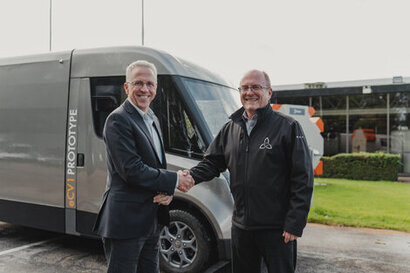
Hydro’s low-carbon aluminium carries a CO2 footprint of just 4.0 kg CO2 per tonne (versus a world average of 16.7kg), thanks in part to the renewable energy used in the production process. The two companies will also evaluate using recycled aluminium with a lower carbon footprint in UK-manufactured automotive structures for the first time.
Overall, WEVC aims to cut embedded carbon in production of its eCV1 electric light commercial vehicle by significantly more than 50 percent compared to other electric LCVs. Leveraging the combination of WEVC’s breakthrough extended design life, patented bonded aluminium Flex-Tech architecture and Hydro’s new low CO2 and recycled aluminium products, WEVC will be the first commercial vehicle manufacturer to significantly reduce CO2 emissions in manufacture, a cornerstone in delivering its sustainability objectives.
“We started WEVC from a clean sheet of paper so are not restricted by legacy platforms or components, giving us freedom in both design and manufacture” said Neil Yates, CEO of WEVC. “Part of our design approach is the patented FlexTech technology used for our aluminium chassis, which gives incredible levels of flexibility and customisation opportunities, but crucially is also very light. In Hydro we have the perfect partner who can deliver very high-quality ‘greener’ aluminium products, which bring a significant reduction in embedded carbon.”
Mr Yates added that forming a development partnership with Hydro enables WEVC to make sure the new alloys have all the right strength and durability attributes and the lowest possible manufacturing emissions, while considering the entire supply chain.
“At WEVC, we also recognise that repair, re-use and recycle philosophies demand changes in both product design, manufacturing process and business practice and this partnership with Hydro will also explore wider opportunities such as more sustainable closed loop recycling during manufacture through to end of vehicle life recycling options” said Mr Yates. “Together we can deliver upon multiple sustainability opportunities that come from fully embracing the circular economy.”
The UK-designed, engineered and built WEVC eCV1 has attracted strong interest from blue-chip companies, keen to utilise its unique capabilities in their extensive vehicle fleets. The van combines low lifecycle emissions, light kerb weight, efficient energy use and large payload capabilities, with the use of lightweight aluminium playing a pivotal role in all those attributes.
The first product from WEVC is designed for production of 5000 vehicles per annum, the innovative and highly flexible vehicle, codenamed eCV1, enables a wide range of electric CV designs, facilitating mission-specific models which meet customers’ particular fleet requirements.
The first of multiple commercial vehicle offerings to come from WEVC, the eCV1 uses the company’s breakthrough, patented Flex-Tech architecture, a sophisticated yet cost-effective modular electric vehicle platform. Developed to support commercial fleet operators and specialist vehicle converters in the transition to an electric future, eCV1 will comply with GB and EU regulations and exceed stringent European Type Approval homologation standards.
The WEVC eCV1 prototype has a kerbweight from just 1750 kg, delivering class leading payload and range in the 3.5t and 4.25t segments. Real-world testing started earlier this year as the engineering programme builds towards full design verification test sign-off and start of production in 2025.
For additional information:

